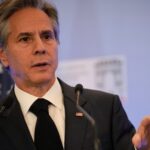Recent actions from the Iranian government have been very telling about the state of the country’s leadership and may have ended the possibility of a new nuclear deal, according to former and likely future Israeli Prime Minister Benjamin Netanyahu.
Following the release of his new memoir, “Bibi: My Story,“ Netanyahu sat down with Fox News Digital in a wide-ranging interview. A few weeks after his Likud Party was victorious in Israel’s election, Netanyahu was skeptical about the future of the Iran nuclear deal in light of their continued nuclear-related activity – and how the world is seeing Iran use deadly force to crack down on anti-government protests.
“It’s probably dead because the entire world saw what the true face of this regime is,” Netanyahu said. “That’s thanks to the extraordinarily brave Iranian women and men who took to the streets – who take to the streets – against this vicious, murderous and brutal regime. And I think people ask themselves, ‘Do we want the ayatollahs, who chant death to America, to have the weapons of mass death and the ballistic missiles to deliver them to any part on Earth?’ and the answer is of course not.”
As the protests calling for an end to the Islamic regime have gone on, news came out that Iran was enriching uranium at an underground facility at a level approaching what is needed for a nuclear weapon. Asked if he is concerned that continued pressure from the demonstrations could make Iran more erratic, Netanyahu did not dismiss the idea but said the protests are exposing Tehran and showing the leadership’s vulnerability.
IRANIAN GENERAL ACKNOWLEDGES 300 PEOPLE HAVE BEEN KILLED IN UNREST DURING NATIONWIDE PROTESTS
“I suppose so, but I think that it also highlights the fact that they’re really weak – that they govern only with basically the threat of murder,” he said. “And the people are showing remarkable resilience.”
As an example of the resolve of the Iranian people, Netanyahu referenced the Iranian World Cup soccer team remaining silent during their national anthem before their first game of the tournament.
WATCH MORE OF FOX NEWS DIGITAL’S INTERVIEW WITH BENJAMIN NETANYAHU: ON HIS NEW BOOK, RISING ANTISEMITISM, AND CRITICISM OF HIS COALITION PARTNERS
“The whole world is watching, and the entire team refused to sing the anthem, not because they’re not Iranian patriots, because they are,” he said. “Because they know their country has been hijacked by this gang of theological thugs who govern simply by terror. And the fact that the entire world sees that I think has made the possibility of stopping Iran’s nuclear program and rolling back the tide of this horribly aggressive regime possible.”
Netanyahu observed that both sides of the political spectrum are more united against Iran now than they had been before. Whether or not this results in actually stopping Iran, he said, “depends on how much the community of like-minded nations unites” to keep them from getting a nuclear weapon.
Netanyahu said that in order to do this, both “crippling sanctions” and a military threat are needed. Regarding the latter, he said Israel is prepared to act regardless of U.S. approval, although he believes that there may now be a more “forward-leaning American position on this matter.”
US AND ISRAEL DISCUSS MILITARY DRILL TO SIMULATE CONFLICT WITH IRAN, PROXIES
Netanyahu angered many American officials in 2015 when he accepted an invitation to appear before a joint session of Congress and speak against the Iran nuclear deal – against the position of then-President Barack Obama. Netanyahu said he respected Obama but disagreed with him on this issue. Going against the president at that time “wasn’t an easy decision,” Netanyahu said, but it was a decision he made out of concern for Israel’s survival.
As it turned out, that speech may have helped lead to the one of the most remarkable regional developments in recent memory: emerging peace between Israel and its Arab neighbors.


“In the course of giving that speech in Congress, our delegation received calls from Gulf governments – Arab governments in the Gulf – who said, ‘We don’t believe what we’re seeing. We don’t believe that your prime minister is willing to take this stand against an American president. It’s very hard,'” Netanyahu recalled. “And that’s what led to meetings in 2015, clandestine meetings with Gulf Arab leaders … and that created the foundations for the Abraham Accords.”
The Abraham Accords are the peace agreements Israel made with the United Arab Emirates, Bahrain, Morocco and Sudan. Netanyahu hinted that more countries could join in the future, predicting that “the best is yet to come.”
WATCH MORE OF FOX NEWS DIGITAL’S INTERVIEW WITH BENJAMIN NETANYAHU: ON THE DOJ’S PROBE OF SHIREEN ABU AKLEH’S DEATH, AND HIS OWN POLITICAL COMEBACK
Netanyahu said that the developing peace with Arab nations debunked the long-standing myth that regional stability would not come until after Israel made peace with the Palestinians.
2 US CITIZENS INJURED IN JERUSALEM DURING DEADLY TERROR ATTACK, AMBASSADOR SAYS
“That’s inside out. My argument is the exact opposite: it’s outside in. Complete the circle of peace with the entire Arab world and then get to the Palestinians,” Netanyahu said. “And perhaps then we could have them abandon their idea that they’ll do away with the Jewish State once they recognize the right – not merely the fact, but the right – of Israel to exist as a Jewish state, then I think we’ll be well on the way to a solution with them as well.”
The Israeli-Palestinian conflict had long been emblematic of a greater conflict between Israel and the Arab world, but that no longer seems to be the case as the local conflict continues despite Arab countries improving relations with the Jewish state. Most recently, Israel was hit by two explosions at Jerusalem bus stops, attacks that Hamas, the group in control of the Gaza Strip that the U.S. has on its list of designated terror organizations, praised, according to Reuters.
Hamas is backed by Iran, setting it apart from much of the Arab world. Netanyahu noted that “the rise of Iran’s threat” was one of “the foundations” of the Abraham Accords, along with Israel’s growing military and technological power.
Another recent point of conflict between Israel and Palestinians involved the death of Palestinian-American Al Jazeera journalist Shireen Abu Akleh. Palestinians quickly blamed Israel, and Israel later stated that Abu Akleh was likely accidentally killed by gunfire from Israeli Defense Forces.
The U.S. Department of Justice said they were going to investigate the matter. Current Prime Minister Yair Lapid came out against this, and Netanyahu echoed that sentiment.
“Israel has its own investigatory powers,” Netanyahu said, adding that the IDF has “really meticulous internal mechanisms” to handle such situations.
“You would not want us to investigate an event in America if you had something happen, a similar tragedy happening in our military,” Netanyahu said, adding that Israel has investigated and will continue to investigate Abu Akleh’s death.
ISRAELI DEFENSE MINISTER CALLS US INVESTIGATION INTO JOURNALIST’S KILLING A ‘GRAVE MISTAKE’
Netanyahu himself has also drawn criticism from U.S. officials, including longtime supporter of Israel Sen. Bob Menendez, D-N.J., over far-right members of the coalition that Netanyahu is looking to form to set up a new government that he would lead as prime minister. In particular, Menendez reportedly referenced the inclusion of individuals like Itamar Ben-Gvir.
Critics have painted Ben-Gvir as a right-wing extremist for his connections and support of far right-wing elements in Israel, including the late Rabbi Meir Kahane, whose ultra-nationalist party was outlawed from running in subsequent elections for inciting racism against Arabs. Kahane was assassinated by a terrorist in Manhattan in 1990. Ben-Gvir said that Menendez’s criticism was “incorrect and mistaken.”
Netanyahu said the criticism was not “morally or logically consistent,” calling out Menendez and others for being silent when his opposition aligned themselves with supporters of the Muslim Brotherhood. Netanyahu accused that group of supporting terror while his partners “support the Jewish State.”
Netanyahu’s likely return to the prime minister’s office comes nearly a year and a half after he was voted out. During his time away from office, he wrote a memoir, “Bibi: My Story,” in which he discusses his military and political career as well as his family, which includes Israeli hero Yoni Netanyahu, who died during a daring hostage rescue mission in Entebbe, Uganda, in 1976.
Netanyahu said that having time away from the prime minister’s office “renewed” his energy to reenter the “cruel” world of politics.
“The reason I came back to power is because I live a life of purpose. And my purpose is to protect the Jewish state and make sure that Israel has a … secure and prosperous existence for the decades to come,” he said.
Netanyahu also addressed a problem facing Jews worldwide: rising antisemitism. The issue has especially been impacting Jews in the U.S. in recent weeks following the spread of antisemitic comments and tropes by notable figures such as Kanye “Ye” West and NBA player Kyrie Irving.
Asked about whether influential figures such as Ye and Irving could empower other antisemites, Netanyahu agreed that this is a concern.
“Yes, I think that’s clear,” he said, calling antisemitism “a chronic disease” that “changes its form” over the 2,500 years that it has existed.
“People look for a scapegoat,” he said. “You’re a capitalist, you blame the Jews who are the communists. You’re a communist, the Jews are the capitalists. You have a problem, blame the Jews.”
CLICK HERE TO GET THE FOX NEWS APP
Netanyahu said the only real defense against antisemitism is to “take a strong stance against it.” He also pointed out that the existence of the state of Israel gives Jews a means of defense, be it militarily, morally, politically or otherwise.
“The rebirth of Israel was meant to give a defense against antisemitism,” he said.
Fox News’s Benjamin Weinthal contributed to this report.




